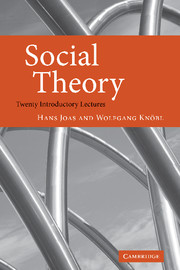Book contents
- Frontmatter
- Dedication
- Contents
- Introduction
- I What is theory?
- II The classical attempt at synthesis: Talcott Parsons
- III Parsons on the road to normativist functionalism
- IV Parsons and the elaboration of normativist functionalism
- V Neo-utilitarianism
- VI Interpretive approaches (1): symbolic interactionism
- VII Interpretive approaches (2): ethnomethodology
- VIII Conflict sociology and conflict theory
- IX Habermas and critical theory
- X Habermas' ‘theory of communicative action’
- XI Niklas Luhmann's radicalization of functionalism
- XII Anthony Giddens' theory of structuration and the new British sociology of power
- XIII The renewal of Parsonianism and modernization theory
- XIV Structuralism and poststructuralism
- XV Between structuralism and theory of practice: The cultural sociology of Pierre Bourdieu
- XVI French anti-structuralists (Cornelius Castoriadis, Alain Touraine and Paul Ricoeur)
- XVII Feminist social theories
- XVIII A crisis of modernity? New diagnoses (Ulrich Beck, Zygmunt Bauman, Robert Bellah, and the debate between liberals and communitarians)
- XIX Neo-pragmatism
- XX How things stand
- References
- Author index
- Subject index
XV - Between structuralism and theory of practice: The cultural sociology of Pierre Bourdieu
Published online by Cambridge University Press: 05 June 2014
- Frontmatter
- Dedication
- Contents
- Introduction
- I What is theory?
- II The classical attempt at synthesis: Talcott Parsons
- III Parsons on the road to normativist functionalism
- IV Parsons and the elaboration of normativist functionalism
- V Neo-utilitarianism
- VI Interpretive approaches (1): symbolic interactionism
- VII Interpretive approaches (2): ethnomethodology
- VIII Conflict sociology and conflict theory
- IX Habermas and critical theory
- X Habermas' ‘theory of communicative action’
- XI Niklas Luhmann's radicalization of functionalism
- XII Anthony Giddens' theory of structuration and the new British sociology of power
- XIII The renewal of Parsonianism and modernization theory
- XIV Structuralism and poststructuralism
- XV Between structuralism and theory of practice: The cultural sociology of Pierre Bourdieu
- XVI French anti-structuralists (Cornelius Castoriadis, Alain Touraine and Paul Ricoeur)
- XVII Feminist social theories
- XVIII A crisis of modernity? New diagnoses (Ulrich Beck, Zygmunt Bauman, Robert Bellah, and the debate between liberals and communitarians)
- XIX Neo-pragmatism
- XX How things stand
- References
- Author index
- Subject index
Summary
In this lecture we examine an author who moved towards a synthetic theoretical project at an early stage, in much the same way as Habermas, Luhmann or Giddens, and who thus became one of the most influential sociologists worldwide from the 1970s on. We are referring to Pierre Bourdieu, whose work was deeply moulded by the national intellectual milieu in which it developed, that of France in the late 1940s and 1950s, a milieu characterized by disputes between phenomenologists and structuralists. But it is not this national and cultural dimension that distinguishes Bourdieu's writings from those of the other ‘grand theorists’ treated in this lecture series. We have seen how much Habermas or Giddens, for example, owed to the academic or political context of their home countries. What set Bourdieu's approach apart from that of his German and British ‘rivals’ was a significantly stronger linkage of theoretical and empirical knowledge. Bourdieu was first and foremost an empiricist, who developed and constantly refined his theoretical concepts on the basis of his empirical work – with all the advantages and disadvantages that theoretical production of this kind entails. We shall have more to say about this later. Bourdieu is thus not to be understood primarily as a theorist, but as a cultural sociologist who systematically stimulated the theoretical debate through his empirical work.
Pierre Bourdieu was born in 1930 and is thus of the same generation as Habermas or Luhmann. The fact that Bourdieu came from a modest background and grew up in the depths of provincial France is extremely important to understanding his work.
- Type
- Chapter
- Information
- Social TheoryTwenty Introductory Lectures, pp. 371 - 400Publisher: Cambridge University PressPrint publication year: 2009
- 3
- Cited by



